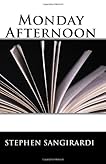 Monday Afternoon by Stephen Sangirardi
Monday Afternoon by Stephen SangirardiMy rating: 5 of 5 stars
A really intense tale of a love affair. The first section grabs you by the throat as you remember what it was like to fall in love during those first few breathtaking hours, and then there is the hangover. Great book
View all my reviews >>

